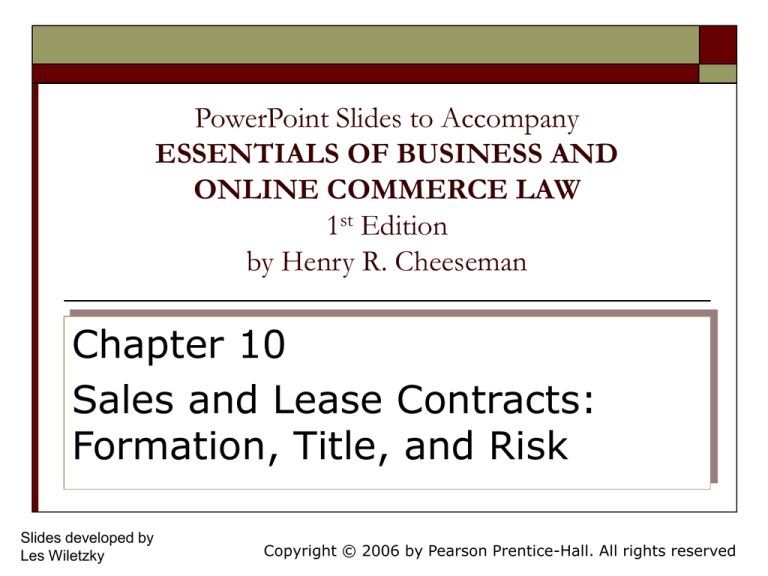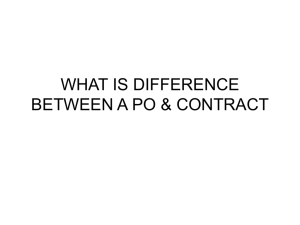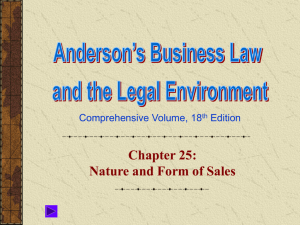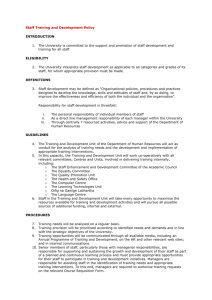
PowerPoint Slides to Accompany
ESSENTIALS OF BUSINESS AND
ONLINE COMMERCE LAW
1st Edition
by Henry R. Cheeseman
Chapter 10
Sales and Lease Contracts:
Formation, Title, and Risk
Slides developed by
Les Wiletzky
Copyright © 2006 by Pearson Prentice-Hall. All rights reserved
Uniform Commercial Code (UCC)
Comprehensive statutory scheme
Serves as a model act
The UCC includes laws that cover most
aspects of commercial transactions
Every state (except Louisiana) has enacted
the UCC as their commercial law statute
Copyright © 2006 by Pearson Prentice-Hall. All rights reserved.
10 - 2
Overview of the Uniform
Commercial Code (UCC) (1 of 2)
Article 1
General provisions
Article 2 (revised) Sales
Article 2A
Leases
Article 3
Negotiable instruments
Article 4
Bank deposits & collections
Article 4A
Wire transfers
Article 5
Letter of Credit
Copyright © 2006 by Pearson Prentice-Hall. All rights reserved.
10 - 3
Overview of the Uniform
Commercial Code (UCC) (2 of 2)
Article 6
Article 7
Bulk transfers
Documents of title
Article 8
Investment securities
Article 9 (revised) Secured transactions
Copyright © 2006 by Pearson Prentice-Hall. All rights reserved.
10 - 4
Scope of Article 2 (Sales)
Article 2 establishes rules that govern the sale
of goods
All states except Louisiana have adopted
some version of Article 2 (Sales) of the UCC
Article 2 is also applied by federal courts to
sales contracts governed by federal law
Article 2 has recently been revised
Has been adopted by some states
Copyright © 2006 by Pearson Prentice-Hall. All rights reserved.
10 - 5
What Is a Sale?
A sale is the passing of title from a seller to a buyer
for a price [UCC 2-106(1)]
Big Cheese
Corporation
Sale of computer
Dell Computer
Corporation
(purchaser)
(seller)
Payment
Copyright © 2006 by Pearson Prentice-Hall. All rights reserved.
10 - 6
What Are Goods?
Goods are defined as tangible things that are
movable at the time of their identification to the
contract [UCC 2-105(1)]
Money and intangible items such as stocks, bonds,
and patents are not tangible goods
Real estate is not a tangible good because it is not
movable
Contracts for provision of services are not covered
by Article 2
Copyright © 2006 by Pearson Prentice-Hall. All rights reserved.
10 - 7
Who Is a Merchant?
A person who:
1. Deals in the goods of the kind involved in the
transaction, or
2. By his or her occupation holds himself or
herself out as having knowledge or skill
peculiar to the goods involved in the
transaction
[UCC 2-104(1)]
Copyright © 2006 by Pearson Prentice-Hall. All rights reserved.
10 - 8
Scope of Article 2A (Leases)
Article 2A applies only to leases involving
goods
Article 2A does not apply to real estate or
other leases
Many states have adopted Article 2A
Copyright © 2006 by Pearson Prentice-Hall. All rights reserved.
10 - 9
Definition of a Lease
Lease – a transfer of the right to the possession and use of the named
goods for a set term in return for certain consideration [UCC 2A-103(1)(i)(x)]
Lessor – the person who transfers the right of possession and use of goods
under the lease
Lessee – the person who acquires the right to possession and use of goods
under a lease
Dow Chemical
Company
Lease
(lessee)
Ingersoll-Rand
Corporation
(lessor)
Equipment
Copyright © 2006 by Pearson Prentice-Hall. All rights reserved.
10 - 10
Finance Lease
A three-party transaction consisting of the
lessor, the lessee, and the supplier
The lessor does not select, manufacture, or
supply the goods
Instead, the lessor acquires title to the goods
or the right to their possession and use in
connection with the terms of the lease [UCC
2A-103(1)(g)]
Copyright © 2006 by Pearson Prentice-Hall. All rights reserved.
10 - 11
Example of a Finance Lease
City Bank
(purchaser)
Sale of airplane
(lessor)
Lease
Payment
Lease
payments
Boeing Aircraft
Company
(seller)
Delivery of
airplane
Jet Blue
Airline Co.
(lessee)
Copyright © 2006 by Pearson Prentice-Hall. All rights reserved.
10 - 12
Formation of Sales and Lease
Contracts (1 of 6)
Any rules established by Articles 2 and 2A
take precedence over the common law of
contracts
Offer
A contract for the sale or lease of goods may be
made in any manner sufficient to show
agreement
This includes conduct by both parties that
recognizes the existence of a contract [UCC 2204(1), 2A-204(1)]
Copyright © 2006 by Pearson Prentice-Hall. All rights reserved.
10 - 13
Formation of Sales and Lease
Contracts (2 of 6)
Open Terms
Sometimes the parties to a
sales or lease contract leave
open a major term in the
contract
Open Price Term
Open Payment Term
Open Delivery Term
Open Time Term
Open Assortment Term
Copyright © 2006 by Pearson Prentice-Hall. All rights reserved.
These open terms are
permitted to be read into a
sales or lease contract
This rule is commonly
referred to as the gap-filling
rule [UCC 2-204(3), 2A204(3)]
10 - 14
Formation of Sales and Lease
Contracts (3 of 6)
Firm Offer Rule [UCC 2-205, 2A-205]
A merchant who (1) offers to buy, sell, or lease
goods, and (2) gives a written and signed
assurance on a separate form that the offer will
be held open,
Cannot revoke the offer for the time stated or,
If no time is stated, for a reasonable time
Three months is the maximum amount of time
permitted under this rule
Copyright © 2006 by Pearson Prentice-Hall. All rights reserved.
10 - 15
Formation of Sales and Lease
Contracts (4 of 6)
Acceptance
The UCC provides that a contract is created
when the offeree (i.e., the buyer or lessee)
sends an acceptance to the offeror, not when
the offeror receives the acceptance
The UCC permits acceptance by any
reasonable manner or method of
communication [UCC 2-206(1)(a), 2A-206(1)]
Copyright © 2006 by Pearson Prentice-Hall. All rights reserved.
10 - 16
Formation of Sales and Lease
Contracts (5 of 6)
Accommodation Shipment
A shipment that is offered to the buyer as a
replacement for the original shipment when the
original shipment cannot be filled
The accommodation is a counteroffer from the
seller to the buyer
The buyer is free either to accept or to reject the
counteroffer [UCC 2-206(1)(b)]
Copyright © 2006 by Pearson Prentice-Hall. All rights reserved.
10 - 17
Formation of Sales and Lease
Contracts (6 of 6)
Consideration
The formation of sales and lease contracts
requires consideration
Under the UCC, an agreement modifying a
sales or lease contract needs no consideration
to be binding [UCC 2-209(1), 2A-208(1)]
Modification of a sales or lease contract must
be made in good faith [UCC 1-203]
Copyright © 2006 by Pearson Prentice-Hall. All rights reserved.
10 - 18
UCC Statute of Frauds
A rule that requires all contracts for the sale of
goods costing $500 or more, and lease
contracts involving payments of $1,000 or
more be in writing [UCC 2-201(1), 2A-201(1)]
The writing must be sufficient to indicate that
a contract has been made between the
parties
Copyright © 2006 by Pearson Prentice-Hall. All rights reserved.
10 - 19
Exceptions to the Statute of Frauds
Following are exceptions to the Writing
Requirement of the UCC Statute of Frauds:
Specially Manufactured Goods
Admissions in Pleadings or Court
Part Acceptance
[UCC 2-201(3), UCC 2A-201(4)]
Copyright © 2006 by Pearson Prentice-Hall. All rights reserved.
10 - 20
UCC Written Confirmation Rule
If both parties to an oral sales or lease contract are
merchants, the Statute of Frauds requirements are
satisfied if:
1. One of the parties sends a written confirmation of the sale
to the other within a reasonable time after contracting,
and
2. The other merchant does not give written notice of an
objection to the contract within 10 days after receiving the
confirmation [UCC 2-201(2)]
Copyright © 2006 by Pearson Prentice-Hall. All rights reserved.
10 - 21
When Written Modification is Required
Oral modification is not enforceable if the
parties agree that any modification of the
sales or lease contract must be in a signed
writing [UCC 2-209(2), 2A-208(2)]
In the absence of such an agreement, oral
modifications to sales and lease contracts are
binding if they do not violate the Statute of
Frauds
Copyright © 2006 by Pearson Prentice-Hall. All rights reserved.
10 - 22
Parol Evidence
A rule that states that when a sales or lease contract is
evidenced by a writing that is intended to be a final
expression of the parties’ agreement or confirmatory
memorandum, the terms of the writing may not be
contradicted by evidence of:
1. A prior oral or written agreement, or
2. A contemporaneous oral agreement (i.e., parol evidence)
[UCC 2-202, 2A-202]
Copyright © 2006 by Pearson Prentice-Hall. All rights reserved.
10 - 23
Comparison of Contract Law and the
Law of Sales (1 of 3)
Topic
Common Law of
Contracts
UCC Law of Sales
Definiteness
Contract must contain all
of the material terms of
the parties’ agreement.
UCC gap-filling rules permit terms to
be implied if the parties intended to
make a contract. [UCC 2-204]
Irrevocable
Offers
Option contracts.
Option contracts. Firm offers by
merchants to keep an offer open are
binding up to three months without
any consideration. [UCC 2-205]
Copyright © 2006 by Pearson Prentice-Hall. All rights reserved.
10 - 24
Comparison of Contract Law and the
Law of Sales (2 of 3)
Topic
Common Law of
Contracts
UCC Law of Sales
Counteroffers
Acceptance must be a
mirror image of the offer.
A counteroffer rejects and
terminates the offer.
Additional terms of an acceptance
become part of the contract if (1)
they do not materially alter the terms
of the offer and (2) the offeror does
not object within a reasonable time
after reviewing the acceptance.
[UCC 2-207]
Modification
Consideration is required
Consideration is not required [UCC
2-209]
Copyright © 2006 by Pearson Prentice-Hall. All rights reserved.
10 - 25
Comparison of Contract Law and the
Law of Sales (3 of 3)
Topic
Common Law of
Contracts
UCC Law of Sales
Statute of Frauds Writing must be signed by Writing may be enforced against a
the party against whom
party who has not signed it if (1)
enforcement is sought.
both parties are merchants, (2) one
party sends a written confirmation of
their oral agreement within a
reasonable time after contracting,
and (3) the other party does not give
written notice of objection within 10
days after receiving the
confirmation. [UCC 2-201]
Copyright © 2006 by Pearson Prentice-Hall. All rights reserved.
10 - 26
Identification of Goods
Distinguishing the goods named in the
contract from the seller’s or lessor’s other
goods
Identification of goods can be made at any
time and in any manner explicitly agreed to by
the parties to the contract
In the absence of such an agreement, the
UCC mandates when identification occurs
[UCC 2-501(1), 2A-217]
Copyright © 2006 by Pearson Prentice-Hall. All rights reserved.
10 - 27
Passage of Title (1 of 2)
Once the goods exist and have been
identified, title to the goods may be
transferred from the seller to the buyer
Article 2 of the UCC establishes precise rules
for determining the passage of title in sales
contracts
Lessees do not acquire title to the goods they
lease
Copyright © 2006 by Pearson Prentice-Hall. All rights reserved.
10 - 28
Passage of Title (2 of 2)
Under UCC 2-401(1), title to goods passes
from seller to the buyer in any manner and on
any conditions explicitly agreed upon by the
parties:
Shipment contracts [UCC 2-401(2)(a)]
Destination contracts [UCC 2-401(2)(b)]
Document of title [UCC 2-401(3)(a)]
Copyright © 2006 by Pearson Prentice-Hall. All rights reserved.
10 - 29
Carrier Cases: Movement of Goods
Generally, goods shipped via carrier are considered to be
sent pursuant to a shipment contract or a destination
contract
Shipment contract – the buyer bears the risk of loss during
transportation [UCC 2-509(1)(a)]
Destination contract – requires the seller to deliver
conforming goods to a specific destination [UCC 2-509(1)(b)]
The seller bears the risk of loss during transportation
Copyright © 2006 by Pearson Prentice-Hall. All rights reserved.
10 - 30
Shipping Terms
Sales contracts often contain the following terms:
F.O.B. (free on board) point of shipment
F.A.S. (free alongside) or F.A.S. (vessel) port of
shipment
C.I.F. (cost, insurance, and freight) and C. & F. (cost and
freight)
F.O.B. place of destination
Ex-ship (from the carrying vessel)
No-arrival, no-sale contract
Copyright © 2006 by Pearson Prentice-Hall. All rights reserved.
10 - 31
Noncarrier Cases: No Movement of
Goods (1 of 3)
A sales contract may stipulate that the buyer
is to pick up the goods, either at the seller’s
place of business or another specified
location
Who bears the risk of loss if the goods are
destroyed or stolen after the contract date
and before the buyer picks the goods up from
the seller?
Copyright © 2006 by Pearson Prentice-Hall. All rights reserved.
10 - 32
Noncarrier Cases: No Movement of
Goods (2 of 3)
Merchant–Seller Rule: If the seller is a
merchant, the risk of loss does not pass to
the buyer until the goods are received
Nonmerchant–Seller Rule: Nonmerchantsellers pass the risk of loss to the buyer upon
“Tender of delivery” of the goods
[UCC 2-509(3)]
Copyright © 2006 by Pearson Prentice-Hall. All rights reserved.
10 - 33
Noncarrier Cases: No Movement of
Goods (3 of 3)
Goods in the Possession of a Bailee (e.g.,
a warehouse) – goods sold by a seller to a
buyer are sometimes in the possession of a
bailee
If such goods are delivered to the buyer without
moving them, the risk of loss passes to the
buyer [UCC 2-509(2)]
Copyright © 2006 by Pearson Prentice-Hall. All rights reserved.
10 - 34
Risk of Loss: Conditional Sales (1 of 3)
Sale on Approval
There is no actual sale unless and until the
buyer accepts the goods
In a sale on approval the risk of loss and title
remain with the seller
They do not pass to the buyer until acceptance
[UCC 2-327(1)]
Copyright © 2006 by Pearson Prentice-Hall. All rights reserved.
10 - 35
Risk of Loss: Conditional Sales (2 of
3)
Sale or Return Contract
The seller delivers goods to a buyer with the
understanding that the buyer may return them if
they are not used or resold within a stated or
reasonable period of time
The risk of loss and title transfer to the buyer
when he or she takes possession of the goods
[UCC 2-327(2)]
Copyright © 2006 by Pearson Prentice-Hall. All rights reserved.
10 - 36
Risk of Loss: Conditional Sales (3 of
3)
Consignment
A seller (the consignor) delivers goods to a
buyer (the consignee) for sale
The consignee is paid a fee if he or she sells
the goods on behalf of the consignor
A consignment is treated as a sale or return
under the UCC
[UCC 2-326(3)]
Copyright © 2006 by Pearson Prentice-Hall. All rights reserved.
10 - 37
Risk of Loss: Breach of a Sales
Contract
Seller in Breach
A seller breaches a sales
contract if he or she tenders
or delivers nonconforming
goods to the buyer [UCC 2510]
Buyer in Breach
Copyright © 2006 by Pearson Prentice-Hall. All rights reserved.
Buyers breach a sales
contract if they:
Refuse to take delivery of
conforming goods,
Repudiate the contract, or
Otherwise breach the
contract [UCC 2-510]
10 - 38
Risk of Loss: Lease Contracts
If the parties to a lease contract do not agree
as to who will bear the risk of loss of the goods
if they are lost or destroyed, the UCC supplies
risk of loss rules:
Ordinary Lease – risk of loss is retained by the lessor
Finance Lease – risk of loss passes to the lessee
Tender of delivery of goods fails to conform to the lease
contract – the risk of loss remains with the lessor or supplier
until cure or acceptance
[UCC 2A-219, 2A-220(1)(a)]
Copyright © 2006 by Pearson Prentice-Hall. All rights reserved.
10 - 39
Insuring Goods Against Loss or Damage
Determine the value of goods subject to the sales or
lease contract
Purchase insurance from a reputable insurance
company covering the goods subject to the contract
Maintain the insurance by paying the premiums when
they are due
Immediately file the proper claim and supporting
documentation with an insurance company if the goods
are damaged, destroyed, lost, or stolen
Copyright © 2006 by Pearson Prentice-Hall. All rights reserved.
10 - 40
Sales by Nonowners (1 of 2)
Void Title
A thief acquires no title to the goods he or she
steals [UCC 2-403(1)]
Voidable Title
Title that a purchase has if the goods were
obtained by:
Fraud
A
check that is later dishonored
Impersonating another person
[UCC 2-201(1), 1-201(44)(d), UCC 2-403(1)]
Copyright © 2006 by Pearson Prentice-Hall. All rights reserved.
10 - 41
Sales by Nonowners (2 of 2)
Good Faith Purchaser for
Value
A person to whom good title
can be transferred from a
person with voidable title
The real owner cannot
reclaim goods from a good
faith purchaser for value
Copyright © 2006 by Pearson Prentice-Hall. All rights reserved.
Good Faith Subsequent
Lessee
A person to whom a lease
interest can be transferred
from a person with voidable
title
The real owner cannot
reclaim the goods from the
subsequent lessee until the
lease expires
10 - 42
Entrustment Rule: Buyer in the Ordinary
Course of Business (1 of 2)
A person who in good faith and without knowledge that
the sale violates the ownership or security interests of a
third party buys the goods in the ordinary course of
business from a person in the business of selling goods
of that kind
A buyer in the ordinary course of business takes the
goods free of any third-party security interest in the
goods [UCC 2-403(2)]
Copyright © 2006 by Pearson Prentice-Hall. All rights reserved.
10 - 43
Entrustment Rule (2 of 2)
The entrustment rule also applies to leases
If a lessor entrusts the possession of his or her goods to
a lessee who is a merchant who deals in goods of that
kind, the merchant-lessee has the power to transfer all
the lessor’s and lessee’s rights in the goods to a buyer
or sublessee in the ordinary course of business [UCC
2A-305(2)]
Copyright © 2006 by Pearson Prentice-Hall. All rights reserved.
10 - 44
Summary: Passage of Title in Sales by Nonowner
Third Parties and Sales of Goods Subject to
Security Agreements (1 of 2)
Type of
Transaction
Title Possessed
by Seller
Innocent
Purchaser
Purchaser
Acquires Title to
Goods
Goods acquired by Void title.
theft are resold.
Good faith
purchaser for
value.
No. Original owner
may reclaim the
goods.
Goods acquired by Voidable title.
fraud or dishonored
check are resold.
Good faith
purchaser for
value.
Yes. Purchaser
takes free of claim
of original owner.
Copyright © 2006 by Pearson Prentice-Hall. All rights reserved.
10 - 45
Summary: Passage of Title in Sales by Nonowner
Third Parties and Sales of Goods Subject to
Security Agreements (2 of 2)
Type of
Transaction
Title Possessed
by Seller
Innocent
Purchaser
Purchaser
Acquires Title to
Goods
Goods entrusted
No title.
by owner to
merchant who
deals in that type of
good are resold.
Buyer in ordinary
Yes. Purchaser
course of business. takes free of claim
of original owner.
Creditor possess
security interest in
goods that are
sold.
Buyer in ordinary
Yes. Purchaser
course of business. takes free of
creditor’s security
interest.
Good title.
Copyright © 2006 by Pearson Prentice-Hall. All rights reserved.
10 - 46
Use of Letters of Credit in
International Trade
The irrevocable letter of credit has been
developed to manage the risks in
international sales
The function of a letter of credit is to
substitute the credit of a recognized
international bank for that of the buyer
Copyright © 2006 by Pearson Prentice-Hall. All rights reserved.
10 - 47






